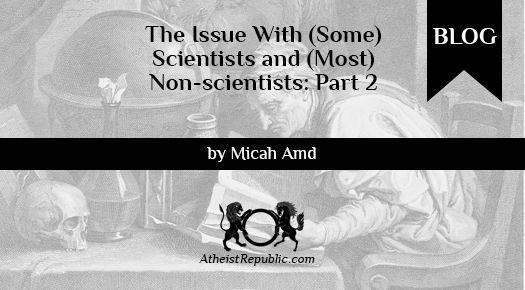
The trends outlined in Part 1 serve to augment the following speculation: the desire/tendency to introduce and maintain an inexplicable ‘unknown’ within one’s system of interest, regardless of what that system may be, is an evolutionary spandrel as useful today as the male nipple. The tendency to reify is so ubiquitous that some scientists have dedicated entire careers conjuring hypothetical universals to verify their own biases, all the while maintaining a cargo-cult aura of “scientism” (I elaborate on this ‘tendency’ in a moment).
When it comes to most non-scientists, however, the gloves are off. Discussions of karma, spirituality, quantum consciousness and so forth abound, driven partially by unverifiable claims of anecdotal ‘authenticity’ and partially by the reifying tendencies to which we are so prone. Fortunately, while verbally-sophisticated humans are prone to bouts of wish-thinking, they by no means need be overcome by them. The first step towards overcoming instances of supernatural beliefs is to understand both why and how they emerge in the first place.
A Universal Tendency
Let us return to the mysterious ‘tendency’ that I have conveniently employed as a scapegoat thus far. According to Google and common sense, a ‘tendency’ is “an inclination towards…a type of behavior”. Circular definitions notwithstanding (tendencies are inclinations, after all), what kind of ‘behavior(s)’ am I referring to? Generally, why are we ‘inclined’ towards some behaviors more than others? Particularly, why are we so adamant about unverifiable entities?
First, a blueprint of why we believe
Symbol-using humans engage in patterns of verbal/linguistic activity within their communities, constructing narratives and abstractions to assist them in predicting changes within their environment. For example, [(see) grey cloud → (predict) rain later]
If no criticism of the communally-constructed verbal patterns are forthcoming, some abstractions become evoked as explanatory causes for otherwise unknowable events at the time (where did the grey clouds come from?). Indeed, some symbols/utterances come to elicit emotions (feelings) in and of themselves. Continuing from our previous example, [{rain god} → [(grey cloud → rain later] because rain god likes you ]. Consequentially, an individual really does ‘feel good’ because emotions can be elicited by reified abstractions that have no bearing on reality (I provide evidence for this notion here).
The continued use of said abstractions, in conjunction with the encroaching psychological rigidity that plagues us as we age, lead to the further actualization of the aforementioned abstractions into a nonsensical ‘real’ in vain hopes of easing death and/or suffering. [people build idols and/or temples to the rain god)
Left unchecked, the laws of the community begin to be attributed to these abstractions in order to ascertain divine authority for constructs that were man-made to begin with. These may be readily distorted in accordance with the wishes of the aforementioned community’s leaders (Rain god “prefers” males to have multiple wives)
Finally, atrocities from genital mutilation to outright homicide become justified in the eyes of the communally constructed abstraction who never speaks, only kills (Rain god “commands” murder of non-group members)
Unless one is careful in demarcating the factual from the conflated, a bizarre concoction of facts, logic and pseudo-science can take over otherwise contemporary personalities, amplified by in-group verification biases (it certainly takes birds of a certain feather to believe that ancient fossils were “placed” in the Earth by Satan in order to tempt us with a false geological age). Despite acknowledgement of the wish-thinking delusion by many prominent thinkers, many continue to distance themselves from launching any ideological offensive given the increasingly tiresome claim that because religious wish-thinking has existed for so long, it should not be discounted so readily.
Anytime we cannot account for an event, whether natural or imagined, through the list of causes that are publicly verifiable, our inclination to explain may supersede our capacity for reason. Wish-thinking is dangerous because an explanation is always forthcoming, regardless of its veracity. Indeed, few things bother homo lingua more than admitting that s/he does not “know” why some emotionally significant event took place, particularly if the contextual determinants are unknown at the time. Feigning knowledge is easier than admitting ignorance, yet it is the acceptance of the latter that precludes a striving towards better answers. One must accept that it is always possible to have a better answer. It is the “perfect” answer of which we must be wary - it make us morally narcissistic and existentially vapid for it justifies any sacrifice attempted to acquire it.
Contrary to my theologistic fellow humans, I do not agree with the notion that religion by default acquires merit through value of its historicity (the utility of ‘syphilis’ may be defended the same way). Traditions emerge in all cultures, and the functions they serve are almost always derived post hoc – but this cannot compete with the amassing wealth of knowledge that is obeying its own iteration of Moore’s law. Would it not be sadistic, or at least inhumane, to withhold soap from a dirty child in the post-germ theory era? I believe it to be just as inhumane, albeit with more distant consequences, to temper an individual’s volitions with metaphysical fairy tales. The consequences of these early indoctrinations can be far-reaching, tainting the perspectives and driving the expectations of the unwillingly subjugated for the remainder of their lives if they’re not careful. Interestingly enough, the more expectations that remain unmet, the further one can go down the metaphysical rabbit-hole.
A path less travelled towards a present less known
Note that I said “can go down…”. This is because a dissatisfaction with expectations can evoke periods of trepidation and rumination, bringing to light the allegedly symbiotic relationship one maintains with his/her reified apparition of choice (Krishna, God, Allah, YHWH, mind, soul, etc.). When, or even if, this relationship is ever brought to question, one of two paths can be taken..
Firstly, and what I suspect to be the more commonly trodden path, a person will engage in cognitive dissonance and modify his/her narrative in light of his/her evolving social environment, adapting and refining attributes of his/her belief system until it corresponds with one’s biases and the contextual circumstances/demands that led to the bout of introspection in the first place. To see such dissonance in action, one can simply go to any news site discussing the most recent terrorist act (at the time of writing, ISIS is all the rage) and scroll to the comments page. For every “This was Islam’s fault because…”, there is a “but they’re not true muslims because…”, and round and round it goes.
Discounting the fact that religious texts are literary oxymorons (in islam, for example, God’s Unchanging Word changed with every ruling dynasty for at least a century until alternative viewpoints were literally purged and the True Word emerged), there are many for whom their beliefs are inseparable from their self-identity.
For persons unaware of how their beliefs are constructed, attacking their belief is attacking them personally. Consequently, the first path is ‘easier’ because it involves sticking with what we know, because it gives us a ‘first cause’ (however imaginary) for all that occurs, because it is the cognitive equivalent of a geocentric mindset (to the unaware mind, it is the sun which sets every evening and rises every morning).
The second path veers haphazardly uphill, towards a dark and dismal forest with no end in sight. This is the path to atheism, as advertised by many of its opponents and supporters, mapped out by minds which continue to resonate long after their demise (cf., ‘Why I’m not a Christian’ – B. Russell). If one could only show the non non-believer the metaphorical “light at the end of the tunnel” at the end of this seemingly treacherous path! For paradise is the “dismal” forest, for there are flowers you can smell, experience you can treasure, and miracles you can measure.
“Dismal” is the perspective you will always feel if you compare reality with an ideal you have never experienced. The Paradise I talk about is transitory, as is life, and like life, it is real. This is the path of the infidel and the non-believer, and it is the path we have chosen to take. We have tried to illuminate this path in the Atheist Republic, with each individual describing his/her own journey, guided and complimented by their personal histories.
Disclaimer
I acknowledge that the inclination to cite spurious constructs as explanatory causes may be rooted in our evolutionary (e.g., enable group/family cohesion, promoting common legislation, etc.) and behavioral (e.g., symbolic communication, motivational factors, reinforcement schedules, etc.) histories. I must stress that it is the latter we must focus on if we wish to arrive at the solution for wish-thinking run amok. Our individual histories provide the content upon which our motivations may act - there are no genetic determinants of supernatural lunacy. Some may argue that such ‘gee whiz’ arguments are no different from the premature extrapolations emerging from proponents of the fantastical “environment of evolutionary adaptedness”, or EEA. For those unfamiliar with the EEA, it is an ad hoc wonderland of limitless theoretical proportions, where explanations for any phenomena may be “found”, negating any need for cumbersome experimentation.
If this accusation is made, I must object, for I have explicitly tried to minimize ‘just-so’ explanations to support my claims. The realizations I share come from the findings of scientists with very broad shoulders, which I have been fortunate enough to be given an opportunity to climb. These findings (collated in my upcoming book, “What is belief?”) demonstrate how communication involving abstract symbols can lead to the rise and maintenance of belief systems (whatever the ‘belief’ may be in, whether it be a belief that the sun will rise tomorrow, or a belief that unicorns create rainbows).
I do not delve into logical/philosophical arguments against supernatural inclinations, which Armin’s and Casper’s books already do an excellent job of. Instead, I summarize selected findings from the experimental analysis of language and emotion from the past four decades to show how basic research has illuminated some of the behavioral processes underlying reification. In any case, the conclusion from the book is the same as the one here – fairy tales are generally just that, fairy tales. Replacing “fairy” with “god” or “duck” do not give the ‘tales’ any more credibility.



